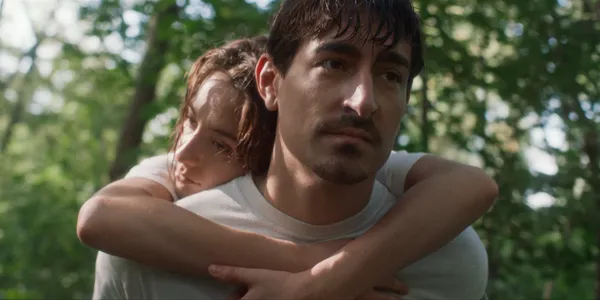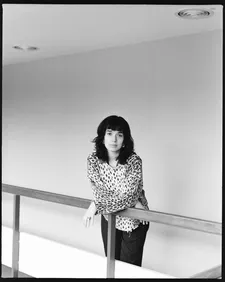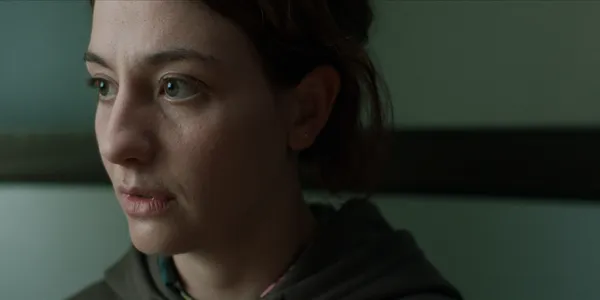 |
| Marie Bloching and Anton Weil as Rose and Sam in The Good Sister. Sarah Miro Fischer: 'We talked concisely about this balance between intimacy and claustrophobia' |
In The Good Sister (Schwesterherz), Rose (Marie Bloching) finds her beliefs and her life shaken after a woman accuses her much loved brother Sam (Anton Weil) of rape and she is called to testify against him. Sarah Miro Fischer’s debut is all the more impressive because it is a graduate film. It is build on strong and nuanced performances, particularly from Bloching – who Miro Fisher describes as “intuitive and spontaneous”. Miro Fischer and her co-writer Agnes Maagaard Petersen explore the ties that bind and torn loyalties. We caught up with Miro Fisher at Berlin Film Festival<> to talk about the origins of the project, her shooting style and the themes she hopes to raise.
There’s a trend at the moment to examine the societal impact of sexual assault rather then just focusing on the perpetrator and the survivor and your film fits with that. What led you to want to draw back from the attack itself and consider the responsibility of others who surround the attacker?
 |
| Sarah Miro Fischer: 'It was important for me to show someone who is kind of trying to find their way in life, and doesn't have everything figured out because I find that more relatable in a way' |
Sarah Miro Fischer: I think the idea came to me when I was at a demonstration and I read a banner that said: “Why do I know so many survivors but no perpetrators of sexual violence?” And my thought was, it’s very easy to have the perpetrator be ‘the other’, if it’s far away, or someone famous. You can say, “Okay, I'll just switch off TV and on and carry on with my life”. But if it comes into your direct vicinity, it's easy to find excuses like, “Okay, this time It was a misunderstanding, this time it was something else” so that you don’t have to change the way you look at life and people around you. And I wanted to examine that a little bit.
It’s also interesting because this character is probably considered by her family to be the least put together out of her and her brother. He is more viewed as the ‘golden child’ by her mother. Why did you make that choice to have someone who isn’t as forthright?
SMF: It was important for me to show someone who is kind of trying to find their way in life, and doesn't have everything figured out because I find that more relatable in a way. I also think that in these subjects it seems to be that everybody knows what is right and wrong and I think it's really important that we allow ourselves and other people to make mistakes and to mistep here and there a little bit and I really wanted her to have the space in the room to not know what's right and wrong all the time.
It's interesting that you talk about ambiguity because I feel like initially anyway the sequence in which she is woken up at night is quite ambiguous for us as well as for her – deliberately on your part.
SMF: Yes, because I think most of these cases usually happen between two people and if you're not one of the two people, you really have to choose what you believe and who you believe and how you come to that conclusion and how you position yourself regarding this conflict. So I think it was really important for us as well as for the protagonist, Rose, to to not know exactly what happened more than is reasonable.
Ultimately, the not knowing is almost encouraging her to ask him and I guess that’s what you’re driving at – that a lot of people basically choose to avoid a direct conversation.
SMF: Yes, definitely. I think, on one hand, she becomes kind of like an investigator. She's trying to figure it out for herself.
She’s investigating herself and how she feels in a way.
SMF: Yes, I think we all have to have this sort of difficult conversation. To sit down together and ask what is going on. If I imagine it was my brother, for example, to say, what do you plan to do now?
Do you have a brother?
SMF: Yes, I have a brother.
How does he feel about this film?
SMF: I kind of put this sibling relationship together because I'm really close to my brother and I feel like he's one of the people that I feel most connected to in the world and I thought, like, okay it would be the most challenging thing for me to have to re-examine that relationship.
Considering the craft of the film, you really use a sound design very cleverly, not just in that key scene at night, but also specifically around water, so that sound is almost triggering for her. Can you talk to me a bit about the choices you made there?
SMF: There were several choices incorporated in that and one of them was we didn't want to see the sexual violence. We thought that we have seen it enough and we don't want to reproduce these images in that classical sense. But we still need to be there in some way and, for me, sound is a very interesting tool to trigger emotions on a more subconscious level because images get to the conscious mind directly whereas sound is a little bit more indirect and kind of stirs things in a more unnoticed way at times. So that was part of why and we thought a lot about what we could tell with sound that we couldn’t tell with images.
 |
| Rose (Marie Bloching) in The Good Sister. Sarah Miro Fischer describes her star as 'intuitive and spontaneous' |
And the water dripping – I felt like I needed to find something that is external because it's a very internal conflict that the protagonist goes through and film is a medium that needs external elements that can be perceived by an audience. I felt like this water dripping at night is something that if we use it again and again, it becomes something not very noticed, but which kind of reminds you of that scene.
The sound design in the interrogation room is also clever, with the sound of the keyboard tapping during questioning.
SMF: It was the sound designer Jakob Mäsel’s idea to use it almost like a pacemaker and then take it away when it gets really intense to just have the silence be louder.
Your framing is also quite deliberate. There's quite a few times when Rose is almost crammed into the corner of the frame, often because somebody else is blocking part of the frame.
SMF: We talked a lot with the director of photography Selma von Polheim Gravesen about the fact we wanted the framing to be precise and for the camera not to take a lot of protagonism. We talked really precisely about this balance between intimacy and claustrophobia.
We wanted the protagonism to be with actors. And then we talked concisely about this balance between intimacy and claustrophobia as you said. In the beginning, there's more movement still in the camera and the protagonist has more freedom to move the camera as she likes. Whereas towards the end, the camera is more static and the protagonist is put in frames within the frame – like, behind the door or behind a person. There are a lot of barriers that make it feel claustrophobic.
Tell me about working with your actors.
SMF: With all of them I did some rehearsing because I wanted to get to know them and I wanted them to have the chance to get to know me and build up a relationship before the shoot because it's so much about trust and and getting to know the language that you communicate in and finding out what works for who and why and how.
Then with Rose and Sam we rehearsed for two weeks. We did a lot of improvisations around the script that weren't part of the story so that we could build the body language and dynamic between the siblings. Rose is kind of stuck with her brother so she's kind of forced to stay in this relationship, she’s forced to face him. Then we wanted to look at the other female characters around him – the girlfriend, the mother – and they all have the possibility to take a different stance on the subject.
I imagine Sam was tricky to write as well as a character.
It was really a long journey to figure out the humanity and to really see how it feels for him and the cognitive dissonance.
It’s interesting how, in families, people can be accommodating towards things they really shouldn’t be accommodating.
SMF: I think nobody wants to be a monster and part of the point of the film is to say he's not a monster, he's a human being who did something horrible, but as long as he thinks that only a monster can do such a thing, he would never be able to think of himself as perpetrator.
And I think in family dynamics and in society, oftentimes, we have a big wish for peace obviously and for non-confrontation. So there is something that I've observed, where I think people tend to choose the easiest solution for a situation and, and for the family, for example, it would be easiest to say we believe him, he didn't do it, because then we can just carry on with our image of him and of ourselves and who we are as a family rather than kind of acknowledging that we have to re-examine everything in a way.
Do you think more should be done in terms of rehabilitation?
SMF: I was really astonished when we were researching, we found a lot of survivor help groups, which I find amazing and great and very necessary to have but we only found one rehabilitation group for violent men. I think there’s an issue in that because I think that for now, a lot of the weight of dealing with these conflicts still hangs on the survivors. There is a work to be done for the perpetrators to like, not just to say, “I did this thing and I wait until my time is done and then I I go back to being where I was” but actually having to face, what made them do this and how they can change so that I don’t do that again.





















